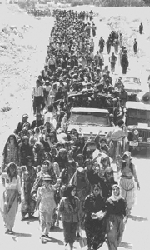|
|
 |
 |
| |
To
find out more about this image, please click
here. |
|
|
|
 |
|
|
|
 |
 |
Current
Research
CHILDREN OF WAR:
CITIZENSHIP EDUCATION AND THE PRACTICE OF DEMOCRATIC PRINCIPLES
Principal
Investigator:
Shahrzad
Mojab
Professor
The past few years have seen a burgeoning of research and writing
in the area of citizenship in Canada and elsewhere. The research I am
proposing is at once an extension, and a departure, from this body of
work. It is an extension because it is informed by the theoretical
debates that have taken place within the field of citizenship studies
over the past decades. It is a departure because of the unique
perspective from which I am approaching these issues. The research
question is: How effective is citizenship education programs in
promoting an understanding of democratic processes, culture and
subjectivity and therefore the fostering of civic engagement, with
youth who have emigrated from conflict zones, particularly Middle
Eastern ones?
For the purpose of this research, I define
citizenship education in the broadest possible terms with an emphasis
on the range of spaces and practices that accomplish education for
citizenship, the nature of the school and classroom culture, and
approaches to pedagogy. Citizenship education is often not explicitly
defined conceptually in curriculum documents and researchers must be
prepared to search out the various spaces, practices and knowledges
that make up citizenship education programs in schools. While
democratic classroom and school spaces and practices help to foster
civic participation at the micro level, co-operation between schools
and communities is integral to supporting and reinforcing the skills
and dispositions that are necessary to multicultural citizenship.
To be able to investigate the complexity of
marginality, ethnicity, and social inclusion, I will use Institutional
Ethnography as the method of data collection and analysis. A particular
strength of Institutional Ethnography is its attention to the everyday
knowledge of people and their experiences—in this case,
marginalized youth from conflict zones of the Middle East. As an
important outcome of this study involves policy recommendations, the
use of institutional ethnography is crucial as it is a research program
designed for such tasks as policy and textual analysis.
The research sites will be four Toronto area high
schools identified as being located in communities with a large number
of immigrants from conflict zones of the Middle East. The high schools
are located at some distance from each other, representing various
communities within the Greater Toronto Area (GTA). The research project
has three distinct phases. In addition to the reports, other planned
outcomes are the development of curriculum models, pre-service and
in-service training programs for teachers engaged in citizenship
education, and recommendations and models for school and community
initiatives. Recommendations will also be developed that are specific
to the educational experiences and special needs of youth who have
experienced war. These reports will be made accessible to school
officials, teachers, social services workers and pre-service teaching
candidates, and materials in general will be developed to address
academics, professionals and members of the community. Efforts will be
made to conduct workshops developed as a result of the research
findings with each of these stakeholder communities. Materials
outlining curriculum models, best practices, and/or policy guidelines
will be produced in accessible formats such as manuals, workshop
models, and executive summaries. The participating school board and
social service organization will be expected to assist in disseminating
these materials. Emphasis will be placed on producing materials using
accessible formats and language. As much as possible these materials
will be made available in the languages of the participating
communities of the Middle Eastern background. The language proficiency
of the Principal Investigator in three languages of the region is a
significant asset for conducting this research.
This website is funded by the
New Approaches to Lifelong Learning project
|
|
